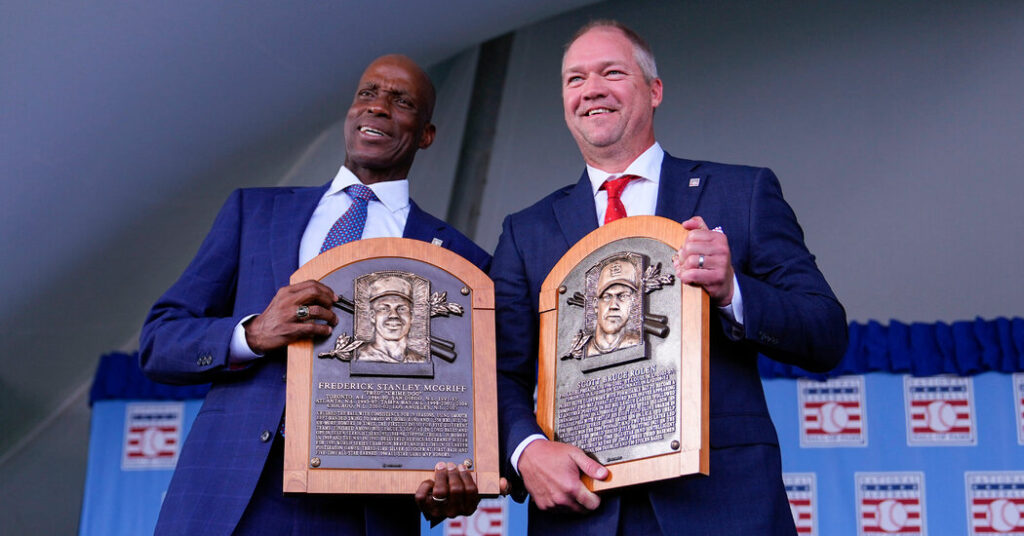Fred McGriff played for six franchises, so many that his new plaque at the Hall of Fame has no logo on the cap. Scott Rolen represents the St. Louis Cardinals, but he played for four teams in all.
“Derek, Chipper,” Rolen said from the stage at the Clark Sports Center on Sunday, “I’ll have to explain that to you later.”
Many of the greats seated behind Rolen — including Derek Jeter, the former Yankees captain, and Chipper Jones, a pillar of the Atlanta Braves — never changed teams. Those players inspire the fiercest loyalty from fans and carry a kind of magnetic pull that compels folks to follow the rolling, rambling roads to the baseball shrine by Otsego Lake.
In that context, it was no surprise that this summer’s gathering was more intimate than usual. Neither McGriff nor Rolen spent more than five full seasons in any one spot, and their ceremony drew around 10,000 fans. Last year’s class, headlined by David Ortiz, the longtime Boston slugger, attracted some 35,000.
But while McGriff and Rolen were well traveled, they were also well respected. Consistent production — in Canada and California, in the Midwest, the Deep South and on the East Coast — kept them in demand and carried them to Cooperstown.
“My goal was simply to make it to the big leagues,” said McGriff, a ninth-round draft choice who went on to match Lou Gehrig’s 493 homers, “and I exceeded every expectation I could ever imagine — and then some.”
McGriff was cut from the varsity baseball team as a sophomore at Jefferson High in Tampa, Fla. He hit .148 in his first pro summer, in 1981, and the Yankees traded him to Toronto as part of a package for Dale Murray, a veteran middle reliever, in December 1982.
Of all the manic moves in George Steinbrenner’s reckless 1980s, the McGriff deal hurt the Yankees most. None of the other exiled prospects who turned into stars — like Jay Buhner, Doug Drabek, Willie McGee and Jose Rijo — made it to Cooperstown.
“That little short porch in right field, that probably would have been a beautiful thing for me,” McGriff said, referring to Yankee Stadium’s inviting conditions for left-handed hitters. But he managed just fine at first base with Toronto, San Diego, Atlanta, Tampa Bay, the Chicago Cubs and the Los Angeles Dodgers.
McGriff’s speech cited several Hall of Famers who helped him along that winding path. He tried to hit like George Brett, the Kansas City batting champion. The renowned executives Pat Gillick and John Schuerholz traded for him. Jones, as a rookie phenom in 1995, helped McGriff win a title with the Braves. Wade Boggs, a Tampa Bay teammate and a hitting savant, encouraged him to look fastball on every pitch.
“I did,” McGriff said, “and it worked.”
Rolen, a third baseman, took a different approach to his speech. In the six months since his election, he said, he thanked some of his biggest baseball influences by sending personal letters. On Sunday, he focused almost entirely on his family.
“It was a simple childhood with simple expectations and lessons,” said Rolen, who grew up in Jasper, Ind., about 50 miles north of the Kentucky border. “Family first; we are loved; and always take the high road.”
He paused.
“And then I got drafted — and so began 20 years of hypertension and acid reflux that I would trade for nothing.”
The Phillies took Rolen in the second round in June 1993, but he had a commitment to play baseball and basketball at the University of Georgia. Before he gave it up to turn pro, Rolen made the roster for an Indiana/Kentucky All-Star basketball game at Market Square Arena in Indianapolis. He felt unprepared and called his father, Ed, for advice.
“Well, Dad,” Rolen said, “I can’t handle the ball, I can’t shoot, I’m completely out of basketball shape, and everybody in the entire gym — including the coach — is better than me.”
“OK,” Ed Rolen replied, and Scott was confused.
Ed Rolen repeated Scott’s words, listing all the reasons to be worried. Then, Ed asked, what can you do? Scott guessed that he could rebound, play defense, scramble for loose balls and out-hustle the other players. Ed said that sounded OK.
“And then here come the words of wisdom: ‘Well, do that, then,’” Rolen said, pausing again as the crowd cheered. “It turns out that ‘Well, do that, then’ carried me into the minor leagues and gave me a simple mind-set: that I would never allow myself to be unprepared or outworked. ‘Well, do that, then’ put me on this stage today.”
Once he internalized his father’s mantra, Rolen said, he never played to prove people wrong. Instead, he played simply to give full effort, every day, and live with the results of that process.
In the end, he earned eight Gold Gloves, hit 316 home runs and won a championship in 2006 with the Cardinals, his first stop after the Phillies and before the Blue Jays and the Cincinnati Reds.
Now, at last, McGriff and Rolen have joined their forever team, the greatest one of all. They are members of the Hall of Fame.


